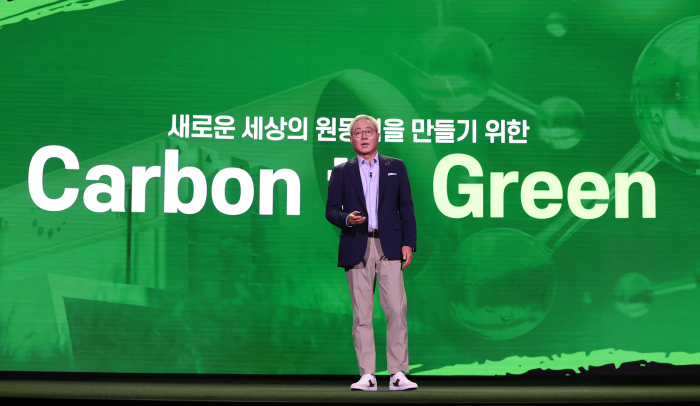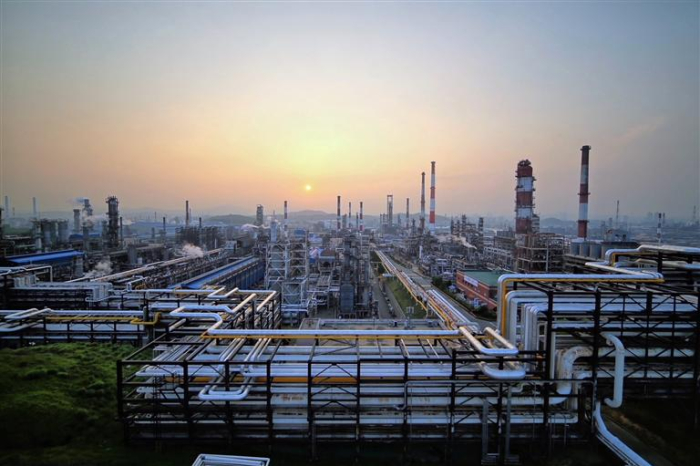M&As
SK Innovation turns to PEFs to sell stake in SK Global
SK Global Chemical fails to draw interest from strategic buyers
By Jul 07, 2021 (Gmt+09:00)
2
Min read
Most Read
Samsung shifts to emergency mode with 6-day work week for executives


CJ CheilJedang to sell feed, livestock unit for $1.4 bn


Samsung Electronics' key M&A man returns; big deals in the offing


Affinity to buy SK Rent-a-Car at $572 mn, more deals expected


Keppel REIT to sell Seoul-based prime office T Tower



As part of its plan for the wholly owned unit to launch a joint venture with a petrochemical company, SK Innovation had reached out to S-Oil Corp. and Hyundai Oilbank Co., as well as global oil refiners.
The stake up for sale, handled by JPMorgan, was expected to fetch between 1 trillion and 2 trillion won ($880 million-$1.76 billion).
To facilitate the stake sale, SK Group proposed a package deal under which it sells the group's petrochemical value chain as a whole, including SK Incheon Petrochem Co. and the Ulsan refining complex of SK Energy Co. along with the stake in SK Global. SK Innovation owns 100% of both SK Incheon and SK Energy, the country's largest oil refiner.
Now SK Innovation is looking to private equity houses to drum up interest, with some global PEFs cashing in on the ESG trends to snap up carbon-emitting businesses at a bargain.

Last week, SK Innovation said it was considering a spin-off of its battery business and listing the separated entity on the Nasdaq. It added that its green projects will account for 70% of its entire business portfolio by 2025 from the current 30%.
Oil refining and petrochemical operations are still the main cash cows of SK Innovation with solid operating profits and earnings before interest, tax, depreciation and amortization.┬Ā
Investment bankers speculate that the company's July 1 announcement may indicate a plan to divest from SK Energy and SK Incheon as well, or reducing stakes in the two petrochemical units.┬Ā
But now might not be the best time to sell them at decent prices, given that most petrochemical companies around the world are hesitant about facility expansion.┬Ā
"It would have been better for SK Group to make the decision (to sell them) a few years earlier. Then it might have attracted global oil refiners and chemical companies keen to secure production bases in Asia," said a petrochemical industry source. "It's regrettable that SK Innovation, at the center of the SK Group, fell behind in asset securitization."
Recently, SK Innovation has raised 1.1 trillion won ($1 billion) from selling a 40% stake in SK Lubricants Co. to Seoul-based IMM Private Equity, eight years after it began the process in 2013 to sell a stake in the wholly-owned unit, or take it public.
To push ahead with the deal, SK Innovation is granting the option to buy back the stake from IMM in case the worlds' largest lube oil maker fails to go public within a designated period of time. The proceeds will be used to build SK Innovation's new electric vehicle battery plant in the US.
(Corrected to drop the sentence of SK Innovation is willing to hand over its management rights in SK Global Chemical, if the buyer wants.)┬Ā
Write to Jun-ho Cha at chacha@hankyung.com
Yeonhee Kim edited this article.
More to Read
-
 EV batteriesSK Innovation to split battery unit, eyes Nasdaq debut as it goes greener
EV batteriesSK Innovation to split battery unit, eyes Nasdaq debut as it goes greenerJul 01, 2021 (Gmt+09:00)
4 Min read -
 Divestment and investmentSK Innovation set to flex muscle with $4 bn in new cash
Divestment and investmentSK Innovation set to flex muscle with $4 bn in new cashMay 02, 2021 (Gmt+09:00)
5 Min read -

-
 Oil refiningSK Innovation divests of stakes in US shale oil fields
Oil refiningSK Innovation divests of stakes in US shale oil fieldsMar 08, 2021 (Gmt+09:00)
2 Min read
Comment 0
LOG IN


